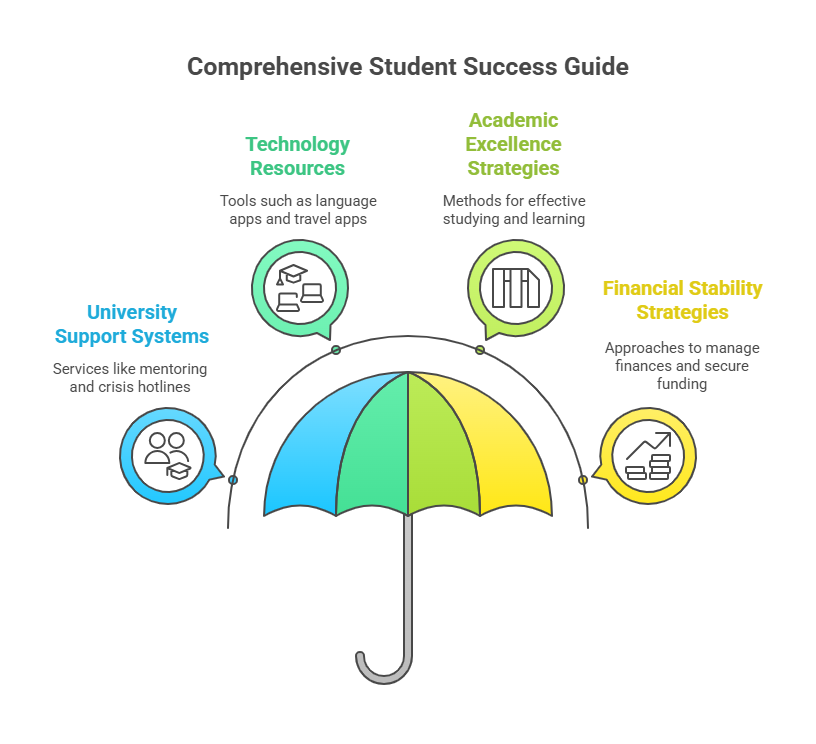1. Housing Crisis: The Biggest Challenge of 2025
The Scale of the Problem
Europe is short about 3 million student rooms right now, and planners say another 200,000 will be needed in the next five years. That shortage lands hardest on newcomers from abroad who lack local networks and usually rely on private landlords.
Immediate Impact:
Finding a place to live before you touch down can be tough. Rent can swallow 60-80% of what you brought every month. University dorm waiting lists stretch from six to twelve months. And scammers see new international faces and smell easy money.
Step-by-Step Housing Solution
Phase 1: Pre-Arrival (6-8 months before)
- Claim on-campus housing the moment you get an acceptance email.
- Search local flat-sharing websites:
- Germany: WG-Gesucht, Studenten-WG
- Netherlands: Kamernet, Room.nl
- France: Crous, LeBonCoin Phase
Phase 2: Document Preparation (3-4 months before)
3. Pull together what landlords will want:
- Proof of enrolment
- Bank statements or financial guarantees
- ID pages and clear translations
- Reference letters from tutors or employers
Phase 3: Secure Temporary Housing (1-2 months before)
- Lock in a short-let for at least two to three weeks.
- Set aside two to three months rent for deposit and first payment.
2. Financial Pressure: Beyond Tuition Fees
Hidden Costs Reality
Monthly Living Costs by Region (2025):
- Northern Europe (Norway, Denmark): 1,200-1,800
- Western Europe (Germany, Netherlands): 800-1,400
- Central Europe (Austria, Czech Republic): 600-1,000
- Southern Europe (Spain, Italy): 500-900
Financial Strategy Framework
Immediate Barriers:
- Visa fees (60-300)
- Proof of funds (8,000-15,000 blocked account)
- Startup costs (2,000-4,000)
- Housing deposits (two to three months up front)
Creating Stability:
- Build a detailed budget and add a 10% cushion.
- Aim for scholarships 12-18 months before your first class.
- Work permit basics (usually capped at 20 hours a week for non-EU students)
- Emergency funds-how to withdraw cash or ask relatives back home
3. Language Barriers: Multi-layered Communication
Beyond Classroom English
Even in programs taught entirely in English, everyday language hurdles pop up:
Academic Challenges:
- mastering subject-specific jargon
- joining group debates with confidence
- adapting to hidden writing rules
- following fast back-and-forth in lectures
Daily Life Issues:
- talking to bank staff or doctor
- reading contracts and medical forms
- steering through red tape
Language Success Strategy
Pre-Arrival Phase:
- check your score with accepted tests (IELTS, TOEFL)
- build vocabulary around your major
- chat on apps like Tandem or HelloTalk
Post-Arrival Integration:
- join campus language tandems
- volunteer in local projects
- study with native buddies
- ask for feedback at writing centres
4. Cultural Integration: Deep Adaptation Challenges
Educational Culture Differences
Northern Europe: learn on your own Germanic: respect the chain Mediterranean: people before paper Eastern Europe: authority still matters
Integration Process
Phase 1: Cultural Awareness (Months 1 - 3)
1. crack the grading code:
- how marks, feedback and resits work
- when to speak-and when to listen
- what tutors expect off-campus
- where plagiarism penalties bite
2. make friends:
- dive into clubs, councils or choirs
- hit post-arrival info sessions
- come to food festivals or movie nights
- find a senior buddy who understands.
Phase 2: Deep Engagement (Months 4-12)
- Pick up the local work culture
- Join volunteer projects in the neighborhood
- Build friendships with both locals and other internationals
5. Visa and Legal Complications: Quick Navigation Guide
Complex Requirements
Every European nation has its own visa rules, renewal steps and paperwork, and that can keep first-year students on edge.
Step-by-Step Visa Management
Pre-Arrival Application:
1. Gather documents (3-6 months ahead):
- Acceptance letter from your university
- Proof you can pay living costs
- Valid health insurance
- Police check or background certificate
- Transcripts translations if needed
2. Submit the application:
- Book consulate slots well in advance
- Hand in a complete file
- Pay the fee (usually €60-300)
- Check progress on the embassy website
Post-Arrival Requirements:
3. Register locally (first month):
- Germany: Anmeldung within 14 days
- Netherlands: Register at the gemeente
- France: Go to the préfecture
4. Keep staying compliant:
- Insurance must stay active
- Tell officials if the address changes
- Renew permits before they run out
- Know what work hours are allowed
6. Academic System Adaptation
Fundamental Differences
Classes, grading and workload can feel very different across Europe, so be ready to adjust note-taking and study habits.
Study Systems Across Europe:
- Northern European - Problem-based learning, team projects
- Germanic - Lecture-heavy, classic written exams
- Mediterranean - Blend of theory and practice, oral tests
Plan for Academic Success
Know Your New Environment:
1. Review what your uni expects:
- credit points (usually ECTS)
- grading scale
- how you will be assessed
- how much you must take part
2. Build the right skills:
- independent research
- adapting your writing
- clear presentations
- critical thinking
Use Your Supports:
3. Uni services:
advisors, writing centres, peer tutors
- Study groups: mix of local and international
- Faculty: office hours, informal talk.
7. Look After Your Well-Being
The Hidden Crisis
International students report more anxiety, depression and loneness than home students.
Contributing Factors
- Distance from family support
- Academic and financial pressure
- Cultural adjustment stress
- Language barriers affecting emotional expression
Building Support Systems
Preventive Strategies
- Preparation before arrival: plan coping tools, read about local services
- Prompt action: reach out to counseling as soon as needed
- Build friendships: join international student groups, use buddy programs
Ongoing Maintenance
4. Professional help:
- University counseling office
- Local community clinics
- Online therapy apps
- Ethnic or cultural support circles
5. Social integration:
- Study circles
- Cultural events
- Volunteer work
- Career mixers

Practical Solutions for Success
University Support Systems
Available Services:
- Pre-arrival online briefings
- Mentor match-ups
- Writing and tutoring centers
- Emergency grants
- 24/7 crisis hotline
Technology Resources
Essential Tools:
- Language apps (Duolingo, Babbel)
- Housing boards and Facebook groups
- Travel apps with student fare
- Mobile banking options
- Insurance and telehealth apps
Long-Term Success Strategies
Academic Excellence
- Develop study schedules that allow extra language time
- Use library staff and online guides
- Approach professors in office hours
- Join or form positive study groups
Financial Stability
- Seek paid work and scholarships
- Keep a simple, country-tailored budget
- Build your emergency fund a bit at a time
- Know the taxes that come with student jobs
Conclusion
Yes, international students in Europe face tough hurdles, yet none is impossible to clear. Real progress comes from planning ahead, keeping expectations practical, and growing a support network early.
Key Success Factors:
- Get ready early-roughly twelve months before you fly
- Allow plenty of time to settle in without rushing
- Reach for help before a small worry becomes a crisis
- Make friends with both international peers and locals
- Stay flexible when unexpected problems pop up
Track Your Progress:
- has my grades stayed strong
- am I building real social ties
- are my finances still on track
- is my language getting smoother
- is my mental health holding steady
Remind yourself that every challenge conquered adds another layer of resilience, agility, and cultural insight to your profile. In todays interconnected job market, those qualities are prized, so your degree-and the struggle behind it-will pay future dividends. There may be hard days on your journey, yet steady preparation and solid support can turn those trials into stepping stones toward success.
FAQS
What are the biggest challenges international students face in Europe?
Language hurdles, fitting into new teaching styles, tight budgets, adapting to different customs, visa red tape, and the search for rent-friendly rooms all weigh on newcomers.
How can international students overcome language barriers?
Enrolling in a course before arrival, swapping conversation with locals, studying through apps, chatting with classmates, and jumping into discussions each class day help build confidence and fluency.
Is it expensive to study in Europe as an international student?
Fees and living costs shift by region; Nordic nations and Switzerland bite hardest, while many Eastern European capitals stay cheaper, so careful budgeting for tuition, housing, food, and travel is essential.
How do international students adapt to European academic culture?
Lectures often demand independent reading, critical debate, and self-organized study, so joining discussions, keeping a tight schedule, and asking professors in office hours for clarification will ease the transition.
What support services are available for international students?
Most universities run welcome weeks, international desks, counselling, peer-tutoring, language cafés, and buddy schemes to help students settle in socially and academically.
International students can meet people signing up for campus in Europe by clubs, going to cultural festivals, playing team sports, joining orientation mixers, and reaching out to local friends as well as other newcomers.





